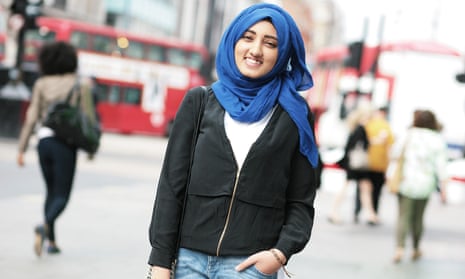Hania Naeem, 22, fashion student, London
I have a huge extended family so Eids are a really big celebration for us. There are about 40 of us, including lots of kids and those who live abroad, who come over for the last week of Ramadan and for Eid.
We wake up super early and go to the Eid prayer. The last few years we’ve gone to them in the park, which is really beautiful. After that we go to my grandmother’s house and she makes a massive breakfast of all sorts of Pakistani food. We go back to my grandmother’s house for dinner as well.
My grandmother always hosts Eid, she cooks up lots of traditional Pakistani dishes. In recent years my mum and a couple of aunts have contributed because it’s too much for her on her own, but she is adamant she should keep hosting it. My grandmother’s house was just sold, so this will be our last Eid there. Every Eid I’ve ever spent has been in that house, so this one will be extra special.
After dinner, you give Eid gifts, but because there are so many people in my family it would be impossible to buy everyone one, so we do Secret Sheika, which is like Secret Santa but an Eid version. We sit around and have conversations about what our Ramadan has been like, whether we feel it’s changed us, what our hopes are for the year.
In Ramadan it’s really easy to feel very spiritual and very connected. There’s a routine – you’re fasting together, you’re all praying together. But it’s only after Ramadan you see whether it’s kicked in, whether the habits have been kept up – praying on time, being patient, being kind. Eid is supposed to be a really spiritual day as well, it’s not supposed to be about just eating and having a good time. There’s a lot spirituality to reap in it. I think this year I’ll take some time out and be thankful for the whole month and having another Eid.
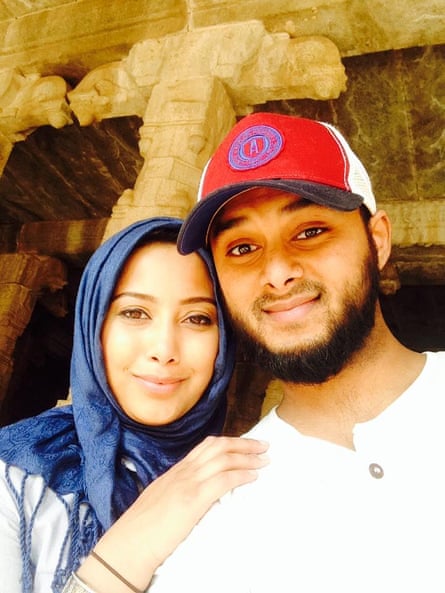
Abdullah Al-Mubin, 25, works in banking, Oldham
For the past two years I’ve been in India for work, so, the past two Eids I’ve been away from my family on what is usually a huge family event. So I’m really looking forward to this year because I’m back with my family and with my local community. Last year my wife and I spent all of Eid in an orphanage [in India], we wanted to spend time with people who were less fortunate than us. We took 80 pizzas, as well as toys and sweets, to the orphanage to these kids who had never had pizza. It was amazing and really humbling.
A big part of Eid is giving. The prophet commanded all Muslims to give a portion of barley and grain to the poor. We can’t give barley, so we give money to charities instead. It’s not compulsory but it is recommended that you give to charity before we make it to the mosque. This year I’ll be visiting the Royal Oldham Hospital’s children’s ward in partnership with Human Aid and I’ll take Eid gifts for all the children in the ward.
We have prayer at 10 o’clock in the morning and every single Muslim would go to the mosque to pray. In the mosque you see all those people you don’t normally see, people you went to school with and new neighbours. When the prayer is finished, it doesn’t matter who’s next to you – black, white, young or old, if you know each other or not – everyone hugs each other three times and says: “Eid Mubarak”. It’s the best feeling; the sense of unity, the sense of brotherhood. You’re hugging for about 20 to 30 minutes. People just keep coming up to you and hugging. That’s the thing I’m looking forward to most.
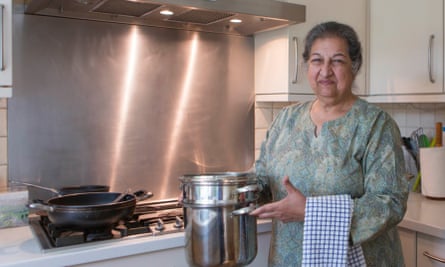
Unaiza Malik, 71, retired IT director and current treasurer of the Muslim Council of Britain, London
We don’t know until the day before when Eid is going to be, because it all depends on the moon sighting. We’ll find out the evening before and then there will be a frantic rush of preparations. It’s like Christmas, you need to do a lot of baking and cooking – it’s a very foodie affair.
Eid basically starts the night before. The children get new clothes and they gather in my house, we put on henna and chop the nuts together for the sheer khurma [traditional sweet vermicelli dish]. The children help or they write cards to their cousins. The preparation is part of the fun.
I have four adult children and three grandchildren. The tradition is the younger people go to the home of the oldest person. I’m a widow now, I lost my husband three years ago, so I stay home and all the children come to me.
I do all the cooking. I love it. My children [two daughters, both university lecturers, and two sons, both doctors] all have such busy lives and they don’t live with me anymore, so when I have them around I like to feed them and cosset them a bit. I can do the cooking slowly over a couple of days and it’s nice to have a proper sit-down meal with curries and biryani and salads.
For the children, because they’re not used to having spicy food, I have to make something separate for them, they like homemade chicken nuggets or fish cakes, anything fried and crumbed. So even though it’s Eid, we’ve sort of adapted it a little bit to fit into our lifestyle.
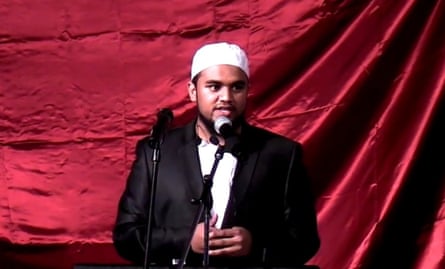
Sayful Alam, 28, secondary school teacher and imam, Cambridge
I’m a part-time imam at the largest mosque in Cambridge. I work in a secondary school as a teacher during the day and in the evening I help out in the mosque as well – volunteering, teaching and leading the prayers.
Through Ramadan people come to the mosque at night-time for a special prayer and people recite the entire Qur’an from memory – not in one night, but over the course of several days. I’m a hafiz [someone who has learned the Qur’an by heart] so I’ve been doing that with three or four other hafizes through Ramadan this year. The prayer starts at 11pm and finishes at half past midnight, so it’s tough. But every night we’re standing and praying to our God, with the intention that he’s going to forgive our sins and with the intention that we want to listen to the entire Qur’an.
This year for the first time I’ll be leading one of the Eid prayers for the mosque. I’m preparing for that now, preparing the sermon I’ll deliver and the rituals.
When we reach the mosque [on Eid] there are thousands of people; men, women and children come along. The imam starts off reciting a few words from the Qur’an in Arabic, a few prophetic narrations, then they give a small sermon in English about what Eid day is, how to enjoy it, how to celebrate it, also about not letting go of all the religious duties we’ve been celebrating throughout Ramadan.
After Eid things calm down a lot at the mosque and personally things will definitely calm down for me. The summer holidays are starting next week and I’ll be on holidays from school, so for me Ramadan has fallen at a really nice time.
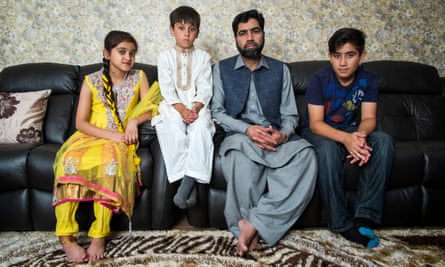
Muhammad Ali, 43, mosque administrator, Birmingham
Eid is a day of reward for Muslims, it’s a day of happiness and joy. I have four children – aged 15, 12, eight and six. They’ve been waiting for Eid the whole month. On Eid day I bring them with me to the mosque in the morning, we have Eid prayers. After that we go home and enjoy lunch together. In the evening we invite friends and family members over, or we go to their houses, we exchange gifts, the children often get money as well as an Eid token. There are also special parks and funfairs with events for the children, they’re very excited about that.
The evening before Eid is called Moon Night and we go shopping. The children save some money for the Eid celebrations and they buy shoes, clothing, girls buy bangles and little ornaments, and gifts for their friends.
We also have a lot of decorations. Sometimes there is competition between the children about who has the most beautiful room. They go to the markets and buy tinsel, lights, small banners, stickers, even butterflies and flowers.
We fast for the whole month of Ramadan, 29 to 30 days. Fasting from dawn to dusk is not an easy task. It’s not compulsory, so for children, pregnant women, breastfeeding mothers, fasting is not for them. But my oldest two children, they kept a few fasts. When children see the adults around them fasting they get excited and they want to participate. My youngest two wanted to try, they fasted for one day, but by the afternoon we asked them to break the fast because it was too hard for them.
